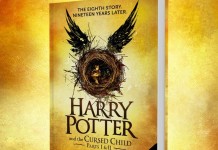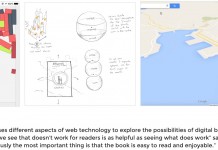
Recently I’ve been enjoying some interesting debates about the relative merits of print and e-books but I’m wondering if this might have distracted me from the truly revolutionary implications of this emerging technology. I’ve started thinking more about all the previously unimaginable ways in which e-books can enhance the reading experience and whether this could change the way we consume literary content altogether.
Authors and publishers can now integrate a variety of different media alongside the written word and this enhanced content is already evident in the growing category of interactive e-books. An excellent example is the ‘Alice’ e-book for iPad, which allows readers to take an active role in the story, for example growing and shrinking Alice by tipping the ipad and making the heads of the tea party participants bob up and down. Another example is the ‘Video Cookbook’, which presents recipes and instructional videos together in an iPhone/iPad app and allows users to add ingredients to a shopping list.
These first examples are just the start though – there are boundless possibilities….. Travel guides can now be integrated with interactive maps, showing the locations of recommended restaurants, with audio files helping users to learn useful foreign language phrases. Educational textbook content can be enhanced with podcasts or YouTube lectures and interactive quizzes to check understanding. By connecting to the Internet via their chosen e-reader, users could also complete in quizzes with other readers or link to forums to discuss sections they didn’t understand.
This does raise the question, however, of how we should define these new book-based mutations? At what point does a book cease to be a book and become a video or a game or an app or even just a website? When you get down to it, some of these so-called e-books are really just repackaged websites, now being presented as an ‘e-book’.
Or do these hybrid creations belong to an entirely new literary category? How should we catalogue them? Could it be that the concept of a ‘book’ as we know it eventually ceases to exist? I find this hard to imagine because books in their current format have been around for such a long time, but then 10 years ago I would have found it hard to imagine a mobile phone that I could use as a camera, map, web browser and to store all my music (to be honest I still find that incredible today).
I would be really interested to hear your thoughts on this issue, please comment! Also, please follow us @MmITScotland


































We recognize a newspaper or news site, we recognize a magazine or its iPad edition, and we recognize a print book and screen ebook by paratext structure. Beyond such contraints we drag formailzations of readers’ expectations.
Elizabeth Eisenstein discusses such moments in her new book; Divine Art, Infernal Machine; The Reception of Printing in the West from First Impressions to the Sense of an Ending. She illustrates that early in the history of book printing the proliferation had already produced “bewilderment and melancholy”, overload and scarcity. The advancing technology became something of an opposite of a determinant. Power agendas, theological positions and social ideologies were all conflicted and institutional strategies dissolved. Attitudes toward printers and the power of print were distinguished by extreme ambivalence.
Print and screen books are now in an interplay of coexistence. You are right to keep your attention on the identity of the book and its paratext structures such as pagination, chapter anatomy, indexing, graphic array of illustration and text, and so on.